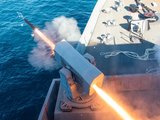China rejects US accusations it seeks hegemony in Asia
China on 31 May rejected accusations from top US officials that it seeks hegemony in Asia and is pushing militarisation in the South China Sea.
Outgoing US Navy Admiral Harry Harris, set to become Washington's ambassador in South Korea, had said on 30 May that while North Korea posed the most imminent threat to the US, China's ‘dream of hegemony in Asia’ was his country's biggest long-term challenge.
The comments were not surprising, Chinese foreign ministry spokeswoman Hua Chunying told a regular press briefing on 31 May, given that ‘those who seek and indulge in hegemony will always think that others are coveting their own hegemony. But no matter how developed China may become, it will never seek hegemony or engage in expansion.’
US Defense Secretary Jim Mattis had vowed on 29 May that the US would keep confronting China over its territorial claims in the South China Sea – where Beijing has established a significant military presence on contested islands.
US diplomats and foreign nations alike were ‘very concerned about this continued militarisation’ in the region, he told reporters.
But Hua termed Mattis' comments ‘rather ridiculous.’
She said: ‘China was not the first country to deploy weapons in the South China Sea, nor is it the country with the most weapons there, and neither is it the country with the most frequent military activities there.
‘As for exactly who is pushing militarisation, everyone can drop the scales from their eyes to see that the answer is self-evident.’
Mattis in February 2018 unveiled the US National Defense Strategy which made clear Washington will focus on Asia in the context of China's growing military might.
Meanwhile, Chinese Ministry of Defence spokesman Ren Guoqiang told a regular press briefing in Beijing on 31 May that the country's sole operational aircraft carrier – the ‘Liaoning’ – has reached initial combat readiness.
The carrier group has conducted multiple exercises which have ‘effectively tested (its) comprehensive attack and defence system’ and prepared it for combat operations on the open seas, he said.
More from Defence Notes
-
![Singapore Airshow 2026: ST Engineering hints at export success for AME assault rifle family]()
Singapore Airshow 2026: ST Engineering hints at export success for AME assault rifle family
The Singapore-based technology company unveiled its new rifle family at this week’s airshow. Chen Chuanren spoke with the ST Engineering’s head of small arms to find out more about how the weapons have been refined.
-
![High tension in the High North – a wake-up call for NATO’s future Arctic defence efforts?]()
High tension in the High North – a wake-up call for NATO’s future Arctic defence efforts?
Any potential ‘Arctic Sentry’ mission would be months in the planning, but with tensions high in the region given the US’s push for Greenland, NATO countries will need to continue to emphasise their commitment to the region, analysts have said.
-
![Venezuela prepares personnel and equipment for a potential second US attack]()
Venezuela prepares personnel and equipment for a potential second US attack
Defence Minister Gen Vladimir Padrino López has declared that the Venezuelan armed forces “will continue to employ all its available capabilities for military defence”.
-
![As the new year starts, the UK defence spending delay continues]()
As the new year starts, the UK defence spending delay continues
The UK’s defence spending commitments remain uncertain as the government’s Defence Investment Plan, which had been due by the end of 2025, is yet to be published.
-
![How might European countries look to tackle drone incursions?]()
How might European countries look to tackle drone incursions?
Disruption of infrastructure in Europe, whether by cyberattack, physical damage to pipelines or uncrewed aerial vehicles flying over major airports, as has happened more recently, is on the rise. What is the most effective way of countering the aerial aspect of this not-so-open warfare?

























